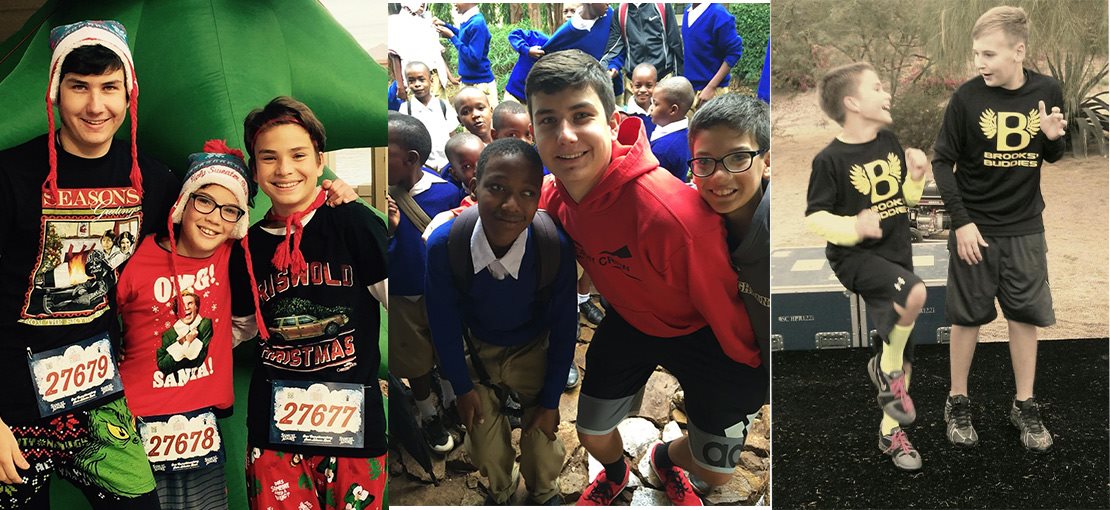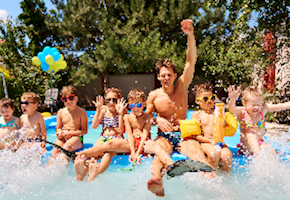Why it Matters Now More Than Ever that Kids Experience Empathy and Giving
“Not all of us can do great things. But we can do small things with great love.” - Mother Teresa
With hate-filled comments filling up our social media, riots in our streets over politics, increased isolation due to rising COVID cases, and racial tension at an all-time high, we parents, now more than ever, need to not only teach, but MODEL empathy and compassion for our kids.
Kids have a natural empathy, especially for other kids. I think they can actually picture themselves in others’ shoes. When they see someone like them struggle and in despair, they automatically want to help. As parents, it's up to us to facilitate the process by putting them in the right situations and circumstances (safely organized, of course).
Here is a short list of tips to get started modeling compassion, teaching empathy, and giving:
1. Start them young.
This ingrains that empathy and compassion into their little souls. However, more important than anything on a large scale, like cleaning up after a natural disaster or traveling to a foreign country, is doing small meaningful things consistently in your own community. Adopt families during the holidays, have children share part of their allowance to donate to their favorite charity, even better have them organize their own “walk” teams for fundraising. For example, my son organized “Brooks’ Buddies” to benefit JDRF. (Juvenile Diabetes Research Foundation) He, being a type-1 diabetic himself, loved the idea of sharing the knowledge with friends and family every year and has had up to 70 kids on his team. He designed his own t-shirts and had a party after. Today he has a photo of each year’s team and the logo for his tees on his wall and he often speaks about the events being some of his best memories. In addition, he has evolved into a young man who is always creating teams of some sort.
2. Open a child's mind to everyday opportunities of the good around them.
Do your kids write thank you notes? Not just for gifts but for the kindness of others: If a family takes them on a trip or out to eat - why not acknowledge how fun it was with a note? What if a teacher helps through a tough spot, acknowledge the kindness. This manifests gratefulness and accountability. Keep them involved in some sort of spiritual community. Take them out into nature and teach them to respect it, they need to not only respect other human beings but our world and all of the creatures in it. Hike, camp, boat, travel, but don’t just do it, engage your kids into the experience and discuss what they are grateful for and how they can pay it forward.
3. Make philanthropy fit the child.
For example, if you kid likes sports, have them work with a disabled sports team, if they love to read, have them read to kids in the hospital or help with storytime at your neighborhood library. The camaraderie and energy developed during these projects build self esteem and inclusiveness. It’s also fun to
incorporate a cool activity with a volunteer project or trip that gives everyone something special to look forward to and builds amazing family memories together.
4. Set up an adventure philanthropy.
The goal is to have fun together, learn a new culture, understand the bigger picture. This does not have to be overseas - there are great Habitat for Humanity projects in our country as well as clean-up opportunities in natural disaster-affected areas. An adventure can be across town as easily as across the country. Be creative!
5. Set it up as a win-win.
Something that coincides/coordinates with the project. Helping can be rewarding in more than one way. The fun coincides with the work which then becomes habit and lasting memories are made. Older kids can apply for service scholarships, which is another way to help them realize the fruits of their labor. When I ask my kids, “What inspired you most to be philanthropic?” They answer that watching what I did influenced them, but incorporating the projects into unique family opportunities made it cool. Giving should not be seen as a chore, it should be something everyone looks forward to, and should be in context with a larger adventure vs. a thing to cross off the list. Let your children give in the way that resonates most with them and their empathy will take on a life of its own.
6. Do it together.
Model, model, model. Don’t just send them off alone to do their good work. Do it with them. Invite friends and family. With awareness and direction, we understand that modeling is important but only part of the equation. It’s also vital for kids to work alongside their parents while having their questions answered in a context for learning.
It’s time to be present, pay attention, get off the phone, and look around. Elevate your family life at home, give back to your community, and take a chance and do something to support someone else, or even an entire community.
Michelle Moore is the mom of three boys and founder and president of Mother’s Grace, a nonprofit that addresses the critical needs of mothers and their children in the midst of tragic life events. Her new book, A Mother’s Grace: Healing the World One Woman at a Time shares the stories of 12 rockstar moms who are setting the world on fire helping others.






Add A Comment
Thank you for your comment.
Sorry! There was a problem with your comment submission. Please try again.
Comment
Allowed HTML: <b>, <i>, <u>, <a>
Comments
Thank you for your comment.
Sorry! There was a problem with your comment submission. Please try again.
Thank you for your comment.
Sorry! There was a problem with your comment submission. Please try again.